Frequently Asked Questions (FAQs)
What is Vision 2030 Jamaica – National Development Plan?
Vision 2030 Jamaica is our country’s first long-term national development plan and covers the 21-year period 2009–2030. It represents a critical phase in our country’s path to sustainable and inclusive development, as part of achieving a secure and prosperous future that goes beyond 2030. Vision 2030 Jamaica is geared towards the achievement of the Jamaica we want and presents Guiding Principles and a Road Map to achieving that Jamaica.
Accordingly, Vision 2030 Jamaica defines long-term development goals and outcomes, which we plan to achieve by 2030, and the vision to be realized, as captured in the Vision Statement, “Jamaica, the place of choice to live, work, raise families and do business”. Vision 2030 Jamaica lays out a path/Road Map, including strategies and actions, towards the achievement of the long-term goals and outcomes. The Road Map was developed based on an assessment of the opportunities and challenges in the Jamaican and global environment at the time when the plan was being developed, as well as forecasts and assumptions about the conditions that would be faced by the country over the implementation period 2009–2030. Accordingly, the plan has built-in mechanisms for continuous improvement and timely response to changing realities, including national and global shocks, such as the global financial crisis (2008/09) and the novel coronavirus 2019 (COVID-19) global pandemic along with other shocks that we are likely to face up to 2030. If we achieve all that was originally laid out in Vision 2030 Jamaica, when it was launched in 2009, we will not only achieve the Jamaica we want, but we will have also achieved developed country status.
The Plan:
-
- tells us where we want to be as a country by 2030 (goals and national outcomes)
- states what we have to do to get there (strategies) and includes ways to determine if these strategies are effective (evaluation)
- presents a road map to achieve our long-term goals, including four successive three-year Medium Term Socio-Economic Policy Frameworks (MTF) that tell us what we are tangibly working to achieve and what are the priority approaches and actions we must take
- includes ways of finding out (monitoring), on an on-going basis, if we are doing and achieving what was planned
- includes mechanisms for ensuring participatory development, accountability and transparency, including stakeholder engagement, consultations, knowledge and information sharing, and reporting.
What does developed country status mean for us?
A developed country is normally described as one that has a high standard of living and opportunities for human development, good quality infrastructure such as roads, bridges, water supply and sanitation, as well as advanced industries and high levels of research and innovation. We will regard Jamaica as developed when all our citizens enjoy a sustainable and high quality of life and benefit from social, economic and environmental equity, inclusion and justice along with minimum social protection guarantees. Within this Jamaica, we will see all our people benefiting from world-class education, health and nutrition, decent work and economic diversification and expansion, water and sanitation, world-class infrastructure, clean air and water, justice, safety and security, among others.
Why 2030?
Vision 2030 Jamaica is a long-term plan and hence it was necessary to present an adequate period in which the long-term goals and outcomes of the plan could realistically be achieved — 2009–2030. Vision 2030 Jamaica is results-based, which means that the focus is not on completing programmes, projects and activities and ticking a box and celebrating success. This can be done in the short to medium term. Instead, the focus is on ensuring that the investments we make in programmes, projects and other activities lead to planned systemic and structural changes in the circumstances and opportunities for Jamaicans – we complete our planned development activities and continue working towards seeing the development-based changes that were planned in education, health, and employment, among others. A long-term development plan allows us to work towards and maintain focus on these systemic and structural development results/changes and measures progress towards their achievement. A long-term plan also allows us to focus on sustainability and continuity in the development process — we use lessons learned in Plan implementation to improve our approaches and actions, which include discarding approaches and actions that do not work, building on those that do work and fixing those that have gaps and glitches.
Jamaica’s quest to achieve the Jamaica we want, including national development planning, is an on-going process, and will not end in 2030. Vision 2030 Jamaica is not an end in itself, but lays a foundation for Jamaica to achieve its fullest potential in the quality of life of its citizens and its role within the wider global community for the rest of the 21st century and beyond.
Why do we need a long-term national development plan?
When we take stock of our progress since our Independence in 1962, we see a beloved country that can boast of many achievements at home and abroad. We have made great strides in our social reforms, keeping our democratic traditions, and promoting our culture and sports. We have seen expansions in industries such as tourism, telecommunications, entertainment, and the financial services.
But we also see a country that did not, before Vision 2030 Jamaica, focus on results-based long-term national development and the results associated with that approach. The challenges associated with short-term development planning can be examined within the context of planning and budgeting for our own lives. If we give too much attention to the short term, we risk losing focus of our future and the quality of life that we would like to have throughout our lifetime. Within the context of national development, this means that we do not clearly define the future we want and work towards it — we do not give adequate focus to sustainability and how the actions of today will impact on who benefits from development and how they will benefit. It means that we do not give adequate focus to ensuring that today’s decisions on social, economic and environmental development will lead to balanced social, economic and environmental development, where none is sacrificed for the other. It also means that as we budget, we do not give adequate attention to the needs of tomorrow, which could result in us spending only on the considerations for the immediate, and making inadequate provisions for development investments and responding to shocks and unforeseen events.
Vision 2030 Jamaica provides a long-term plan to respond to the challenges of today and tomorrow as we follow a planned and structured path to achieving the future we want. It allows us to maintain focus on achieving our planned goals and outcomes, while utilising information/evidence to inform what we do, when we do it and for whom, with mechanisms in place to change our approach and actions to meet changing realities.
How will Vision 2030 Jamaica ensure a secure and prosperous future for all?
Ensuring a secure and prosperous future for all Jamaicans requires a major transformation from a middle-income developing country to a country that can afford its citizens a high quality of life and world-class standards in a range of areas, including education, health care, nutrition, civility and social order, and access to environmental goods and services such as clean air and water, among others.
Vision 2030 Jamaica introduces a new paradigm, which since its promulgation in 2009 has continued to redefine the strategic direction for Jamaica, one which puts us on a different path — a path to sustainable prosperity, and one that moves us from dependence on the lower forms of capital to developing and sustaining the higher forms of capital , that is, our cultural, human, knowledge and institutional capital stock. This will serve to move us into the higher stages of development and also to position us to add value to the lower forms of capital, moving us into an innovation-driven stage of development.
However, we know that simply changing our approach to how we achieve growth and enhance the quality and delivery of public and private goods and services will not ensure that all will benefit from a secure and prosperous Jamaica. Vision 2030 Jamaica has seven guiding principles, which embody sustainability, equity, inclusion, justice, and good governance (the guiding principles are presented below). Vision 2030 Jamaica represents a commitment to equitable and inclusive development which “leaves no one behind”. All are to be engaged as change agents in the development process and are to be afforded equal opportunity to benefit from the fruits of our collective labour to achieve our planned goals.
Who prepared Vision 2030 Jamaica – National Development Plan?
The preparation of Vision 2030 Jamaica was led by the Planning Institute of Jamaica (PIOJ). The PIOJ Act stipulates that the organization is responsible for guiding the long-term development planning for the country. The Plan was developed using participatory processes and includes the views and contributions of young persons, non-governmental organizations (NGOs) and community groups, the church, political parties, trade unions, media, and public and private sector organizations as well as the Diaspora.
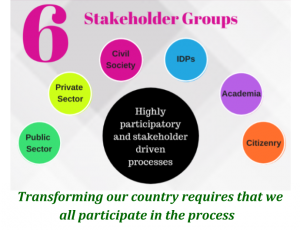
Who is responsible for implementing Vision 2030 Jamaica?
The implementation of Vision 2030 Jamaica started in 2009. The Plan is implemented by Government Ministries, Departments and Agencies (MDAs), the private sector, civil society organizations, non-governmental organizations (NGOs), community-based organizations (CBOs), and other development actors — supported by key partners, including our International Development Partners (IDPs). MDAs include and align Vision 2030 Jamaica into their strategic/corporate and operational plans and budgets; and many of the IDPs align their country programmes to support Jamaica’s development, with Vision 2030 Jamaica. The primary tool for implementation of the Plan is the three-year Medium Term Socio-Economic Policy Framework (MTF). Each MTF serves as a companion document to the Plan, and comprises the medium-term priority strategies and actions that will be pursued over a three-year period. We are currently implementing MTF 2018 – 2021, which is the fourth MTF since plan implementation began.
How long have we been implementing Vision 2030 Jamaica?
We are now in the 13th year of implementation of the 21-year Vision 2030 Jamaica – National Development Plan. The Plan was promulgated in May 2009, with fiscal year 2009/10 being the first year of implementation. Fiscal year 2021/2022 will be the 13th year of implementation of the Plan.
What are our Vision 2030 Jamaica National Goals?
There are four National Goals of Vision 2030 Jamaica. These are as follows:
- Jamaicans are Empowered to Achieve their Fullest Potential
- The Jamaican Society is Secure, Cohesive and Just
- Jamaica’s Economy is Prosperous
- Jamaica has a Healthy Natural Environment
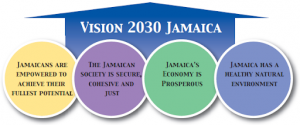
The national goals are mutually reinforcing and synergistic in design, and their achievement cannot be realized in isolation. The four goals of Vision 2030 Jamaica cover the three dimensions of sustainable development: Goals 1 and 2 are social goals; Goal 3 is an economic goal; and Goal 4 is an environmental goal.
The goals give greater articulation to our national vision statement and are the pillars on which the new paradigm for Jamaica’s sustainable prosperity rests. Operationally, the four national goals are mapped into 15 National Outcomes which, in turn, are pursued through National Strategies.
What is the Jamaica we want by 2030?
The Jamaica we want by 2030 is captured in the 4 Goals and 15 National Outcomes of Vision 2030 Jamaica, which represent the intended changes in development conditions. These goals speak to the tenets of what Jamaicans believe would constitute a good quality of life and reflect what is needed to ensure that this good quality of life is equitably enjoyed by all Jamaicans. It is evident that Jamaicans want holistic development that addresses their physical, social, cultural, and economic well-being and their relationship with the environment; and promotes participatory, knowledge-based governance geared towards inclusion, equity, and justice.
The achievement of the 15 National Outcomes will lead to the realization of the 4 National Goals. The goals and their associated national outcomes, along with the national strategies and actions for their achievement, represent a development planning approach that is goal-oriented. This means that we interlink development results with evidence-based plan implementation targeted on the achievement of the development results. In other words, everything we do is focused on the achievement of the National Goals and Outcomes, and while we will invariably have to adjust planned approaches and actions to respond to changing realities, the Jamaica we want and are working to achieve, will not change.
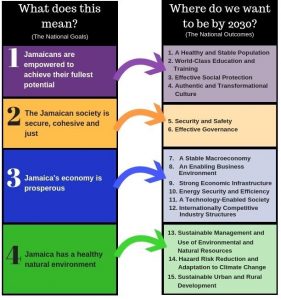
What are the Vision 2030 Jamaica Guiding Principles?
Vision 2030 Jamaica is based on seven Guiding Principles that put people at the centre of Jamaica’s development. These are: (list guiding principles). The Guiding Principles give priority attention to the elements that are essential to delivering a world-class quality of life to all Jamaicans and reflect the key pillars of change needed to achieve Vision 2030 Jamaica.
The Guiding Principles define for development actors, including the citizenry, the mindset and transformation in our culture that are required for the achievement of Vision 2030 Jamaica. Core values such as respect, honesty and truthfulness, forgiveness, tolerance, trust, honour, discipline, responsibility, cooperation, good work ethic and punctuality complement the Guiding Principles and are essential for transforming Jamaica and the achievement of our goals.
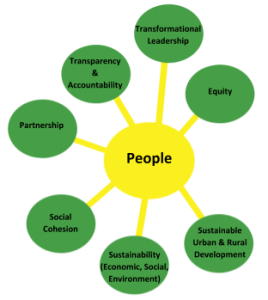
What does National Goal 1 “Jamaicans are empowered to achieve their fullest potential” mean?
Vision 2030 Jamaica will create a society in which all Jamaicans are empowered to participate fully in the development of their country and to develop their talents and abilities, thereby elevating their standard of living and quality of life. This will entail equitable and inclusive access to essential public and private goods and services within communities that are equipped to advance social, economic and environmental development and justice; and meet basic needs to support health and longevity, and income and social security. Jamaicans will be empowered to achieve their fullest potential when the following national outcomes are realized:
- A Healthy and Stable Population
- World-Class Education and Training
- Effective Social Protection
- Authentic and Transformational Culture
Through these national outcomes, we will improve on our achievements in social development, including advancing: the mainstreaming of population in all aspects of development, world-class education, training, health care, innovation, cultural preservation, and systems geared to protect the vulnerable in our society.




What does National Goal 2 “The Jamaican Society is Secure, Cohesive and Just” mean?
Vision 2030 Jamaica will achieve the goal for the Jamaican society to be secure, cohesive and just when we realize the following National Outcomes:
- Security and Safety
- Effective Governance
This goal represents the critical importance of effective governance and security and safety as tenets of a high quality of life. It gives focus to furthering Jamaica’s development towards the achievement of a society that demonstrates equitable value for all life and well-being, and the protection of the physical, cultural and other representations of our collective accomplishments as a people. This also includes the strengthening of the state and other systems, structures, institutions and relationships that support life and well-being, including the rule of law and judiciary, national security apparatus, our political institutions, local authorities and community-based organizations. There is also focus on the development of and open access to data, statistical and information systems.
Within a safe, secure, just and cohesive Jamaica, crime rates will be low and human rights will be effectively protected. State sovereignty and Jamaica’s territorial waters and cyber space will be also be protected. The citizenry will have equitable opportunities to engage and benefit from state and local government, security arrangements and institutions as well as the justice system through the advancement of restorative justice, rehabilitation and reintegration, among other areas. Increased trust in state, corporate and community governance, and fellow citizens will be supported through developed systems for accountability, transparency, and policy coherence and effectiveness. Participatory development will be strengthened and the citizenry will be empowered and enabled to apply and construct empirical-based knowledge in creating the Jamaica we want.


What does National Goal 3 “Jamaica’s Economy is Prosperous” mean?
Vision 2030 Jamaica creates a new paradigm for economic prosperity. It calls for a transformation of our economic development model from reliance on natural, financial and man-made capital forms to the higher forms of capital — institutional, knowledge, human and cultural. We will improve our productive and logistic capacity, market efficiency, business environment, technology enablement, energy security and efficiency, and the international competitiveness of our sectors towards the achievement of meaningful job creation, and inclusive and sustainable economic growth. We will give focus to creating a more sustainable economic development model underpinned by the principles of sustainable consumption and production, and promoting the green, blue and circular economies and cultural and creative industries. This focus on the higher forms of capital and a more sustainable economic development model are pillars of financial and economic inclusion towards improved capacity for resilience, and greater equity and a narrowing of the wealth gap. The higher forms of capital are infinite in nature and dispel the argument of scarcity as a rationale for inequality and marginalization.
Jamaica will achieve the goal of a prosperous economy when the following national outcomes are realized:
- A Stable Macroeconomy
- An Enabling Business Environment
- Strong Economic Infrastructure
- Energy Security and Efficiency
- A Technology-Enabled Society
- Internationally Competitive Industry Structures






What does National Goal 4 “Jamaica has a Healthy Natural Environment” mean?
The state of our natural and the related built environment is inextricably intertwined with our quality of life. Under this goal, Vision 2030 Jamaica gives focus to the relationship between the natural and built environment and human interactions with both having an impact on the quality of the natural environment, resilience to natural and man-made hazards, and capacity for climate change management and adaptation. This includes the development of a comprehensive integrated approach to hazard risk management and climate change; the implementation of strategies that foster innovative urban and regional planning (based on sustainability principles); the facilitation of the development of multi-sectoral and spatial linkages; and the identification and harnessing of the growth potential of each area, to create sustainable rural and urban communities. It also encompasses related development priorities, such as environmental health. Our ability to effectively manage and develop these areas is determinative of our capacity for continued provision of essential environmental and related goods and services.
Jamaica will have a healthy natural environment when the following three national outcomes are realized:
- Sustainable Management and Use of Environmental and Natural Resources
- Hazard Risk Reduction and Adaptation to Climate Change
- Sustainable Urban and Rural Development



How is Vision 2030 Jamaica Implemented?
Vision 2030 Jamaica – National Development Plan (NDP) is implemented through successive three-year Medium Term Socio-Economic Policy Frameworks (MTF), with each one covering a three-year period. The MTF is aligned to the overall vision, goals and national outcomes of Vision 2030 Jamaica and allows for a stage by stage operationalization of the long-term National Development Plan. It also facilitates continuous improvement of the Plan implementation framework; and real-time adaptation and agility in responding to unforeseen events and shocks through the alignment of the strategic, corporate and operational plans of development actors, particularly government ministries, departments and agencies (MDAs), with the priority strategies in each MTF.
The MTF is informed by an extensive evidence- and results- based process. This includes the utilization of research and stakeholder consultations to identify and define the priority strategies and actions to be pursued in a three-year period to advance the achievement of the long-term goals. The MTF comes into force through Cabinet approval, which is usually accompanied by a directive to Ministries, Department and Agencies (MDAs) to align their strategic and operational plans with the MTF. The MTF is not only implemented by MDAs but by all actors who contribute to Jamaica’s development. This includes: private sector, civil society and non-governmental organizations; faith-based organizations; academia; Municipal Corporations (MCs) through the alignment of local sustainable development planning with the MTF; and international development partners that align their country programmes with the MTF.
Jamaica is currently implementing the 4th MTF, which covers the period 2018–2021.
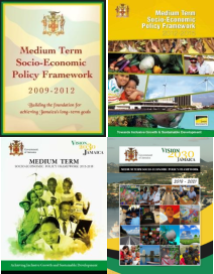
What are the medium-term priorities for 2018 – 2021?
The Medium-Term National Strategic Priorities to be addressed under MTF 2018–2021 are:
- Development and Protection of Human Capital
- Social Protection and Social Inclusion
- Values and Attitudes
- Rule of Law and Timely Justice
- Public Sector Efficiency and Effectiveness
- Economic Stability, Growth and Employment
- International Competitiveness
- Environmental Sustainability and Climate Change Response
Where do the resources come from to implement Vision 2030 Jamaica – How are we Financing our Development?
Jamaica’s development is financed through the budgetary allocations of government and its partners, including international development partners, to national and local level development. It is also financed by domestic and foreign private sector investment, the diaspora, and other groups, including the citizenry, which may not as readily be recognized as development actors but play pivotal roles in Jamaica’s development through their financial/economic choices and actions. These are the sources of financing for Vision 2030 Jamaica.
Who is responsible for coordinating and monitoring the implementation of Vision 2030 Jamaica?
The Planning Institute of Jamaica (PIOJ) is the Focal Point for Vision 2030 Jamaica. The Vision 2030 Jamaica Secretariat located in the PIOJ is responsible for coordinating the implementation of Vision 2030 Jamaica. This includes leading the development of each Medium Term Socio-Economic Policy Framework (MTF) and supporting stakeholders in aligning their planning and implementation with Vision 2030 Jamaica; monitoring and evaluation and reporting; and communications and stakeholder engagement.
The Vision 2030 Jamaica Secretariat reports on the country’s social, economic and environmental development performance (see Jamaica’s Development Results under Resources) against planned development targets, representative of the achievement of medium-term milestones and the long-term, 2030, outcomes.
The Secretariat utilizes analysis of development performance, stakeholder contributions and other sources of evidence to inform medium-term prioritization of development strategies and actions, and continuous improvement in plan implementation. It also plays a lead role in assisting organizations to align their strategic plans with Vision 2030 Jamaica and supports the development of Local Sustainable Development Plans (LSDPs) aligned to Vision 2030 Jamaica. The Secretariat provides impetus for the establishment and operations of Thematic Working Groups (TWGs). TWGs are multi-stakeholder institutional mechanisms geared to support monitoring and evaluation (M&E) in plan implementation and address critical gaps identified through M&E, contingent on the TWG serving as an appropriate forum to do so. Members are drawn from the public and private sectors, civil society, academia, and International Development Partners (IDPs).
Is there a link between Vision 2030 Jamaica and the Sustainable Development Goals?
The short answer is yes! The Sustainable Development Goals (SDGs) are an interdependent set of 17 ‘broad and universal’ development goals with 169 targets, which represent consensus and an urgent call for action by all countries to achieve sustainable and inclusive development by 2030. Vision 2030 Jamaica is a plan for achieving sustainable development in Jamaica and, like the SDGs, addresses the three dimensions of sustainability — social, economic and environmental. The SDGs are an agenda to advance People, Planet, Prosperity, Peace and Partnership (5Ps). This is not dissimilar to the overarching vision for Jamaica and our national goals and outcomes, as well as our country’s guiding principles. This landmark agreement envisions the creation of a better world that is free of poverty and underpinned by universal peace and where ‘no one is left behind’. “Vision 2030 Jamaica…advancing the achievement of the SDGs…leaving no one behind”!
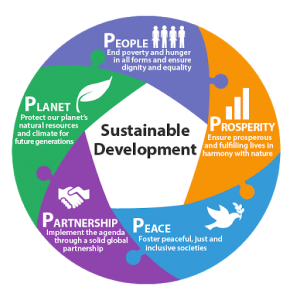
How will the Sustainable Development Goals (SDGs) be achieved in Jamaica?
Vision 2030 Jamaica serves as the axis around which efforts to achieve the SDGs in Jamaica will be organized. A Road Map for SDG Implementation in Jamaica (2017) states a 91 per cent alignment between Jamaica’s national development agenda (Vision 2030 Jamaica) and the SDGs, based on a 2016 assessment. Jamaica has since addressed gaps and demonstrates an over 95 per cent alignment of Vision 2030 Jamaica and the SDGs in Medium Term Socio-Economic Policy Framework (MTF) 2018-2021.

